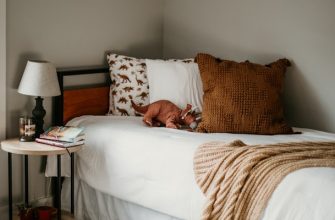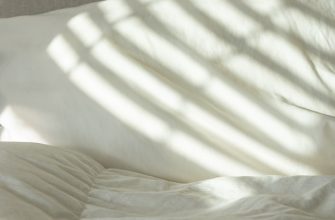- Creating a Calming Sleep Environment: Essential Tips
- The Role of Light and Sound in Sleep Quality
- How to Choose the Right Bedding for Better Sleep
- Incorporating Relaxation Techniques into Your Bedtime Routine
- The Impact of Aromatherapy on Sleep: Scents that Soothe
- Creating a Technology-Free Zone: Benefits for Restful Sleep
Creating a Calming Sleep Environment: Essential Tips
Creating a calming sleep environment is crucial for improving sleep quality. A tranquil atmosphere can significantly impact how easily one falls asleep and stays asleep throughout the night. To establish this soothing sleep space, consider the following essential tips.
- Control Lighting: Dim lighting in the evening helps signal to the body that it is time to wind down. Use blackout curtains to block out unwanted light from outside.
- Choose Comfortable Bedding: Invest in high-quality sheets and pillows that promote comfort. Soft, breathable fabrics can enhance relaxation and lead to better sleep.
- Maintain an Ideal Temperature: The bedroom temperature should be cool, ideally between 60-67°F (15-19°C). A cooler environment supports the body’s natural sleep cycle.
- Reduce Noise: Minimize disruptive sounds by using white noise machines or earplugs. A quiet atmosphere fosters deeper sleep and reduces awakenings during the night.
- Incorporate Calming Scents: Use essential oils, such as lavender or chamomile, to create a serene atmosphere. Aromatherapy can enhance relaxation and improve sleep quality.
- Declutter the Space: A tidy bedroom promotes a peaceful mind. Remove unnecessary items and distractions to create a serene environment conducive to restful sleep.
- Limit Screen Time: Reducing exposure to screens at least an hour before bedtime can help the mind unwind. Electronic devices emit blue light that can interfere with the body’s natural sleep cycle.
By implementing these strategies, a calming sleep environment can be achieved, leading to improved sleep quality. A serene atmosphere is essential for restful nights and rejuvenated mornings.
The Role of Light and Sound in Sleep Quality
Light and sound play a crucial role in determining sleep quality. The right balance of these elements can significantly enhance the sleep environment, leading to deeper and more restorative rest. Understanding how light influences the body’s natural circadian rhythms is essential for optimizing sleep patterns.
Exposure to natural light during the day helps regulate the sleep-wake cycle. Conversely, artificial light, especially blue light emitted by screens, can disrupt this cycle, making it difficult to fall asleep. Reducing exposure to bright lights in the evening can create a more conducive atmosphere for sleep.
- Natural Light: Helps in the production of melatonin, the hormone responsible for sleep.
- Blue Light: Inhibits melatonin production and can lead to sleep disturbances if used before bedtime.
- Dim Lighting: Utilizing soft, warm light in the evening helps signal the body that it is time to wind down.
Sound also significantly impacts sleep quality. A quiet environment is essential for achieving undisturbed sleep. Sudden noises can interrupt sleep cycles, leading to fragmented rest. Incorporating soothing sounds or white noise can help mask disruptive sounds and promote relaxation.
- Soothing Sounds: Nature sounds or soft music can enhance relaxation and create a calming atmosphere for sleep.
- White Noise: Helps to drown out disruptive noises, providing a consistent auditory backdrop that can aid in falling asleep.
- Volume Control: Keeping sound at a low level is crucial, as loud noises can lead to awakening during the night.
To create an optimal sleep environment, it is vital to consider the interplay of light and sound. By minimizing artificial light exposure at night and incorporating calming sounds, a tranquil atmosphere can be established. This approach not only enhances sleep quality but also contributes to overall well-being.
How to Choose the Right Bedding for Better Sleep
Choosing the right bedding is crucial for enhancing sleep quality and creating a calming atmosphere in the bedroom. Proper bedding not only contributes to comfort but also plays a significant role in ensuring restful nights. Several factors should be considered when selecting bedding for optimal sleep.
- Material: The fabric of the bedding can greatly impact sleep comfort. Natural materials such as cotton, linen, and bamboo are breathable and soft, promoting a restful night. Synthetic options might be less breathable, leading to discomfort.
- Thread Count: A higher thread count often indicates softer, more durable bedding. However, it’s essential to find a balance, as extremely high thread counts can sometimes lead to a stiffer feel.
- Pillow Type: Pillows should provide adequate support for the neck and spine. Memory foam, feather, and latex pillows all offer different levels of support, catering to various sleeping positions.
- Comforter Weight: The weight of the comforter can influence sleep temperature. Lightweight options are ideal for warmer climates, while heavier comforters provide warmth during colder months.
- Color and Design: The visual aspect of bedding can impact mood. Soft, calming colors like blues and greens create a serene environment, while vibrant patterns might be stimulating.
Incorporating these elements when selecting bedding can significantly enhance sleep quality. Investing in high-quality bedding tailored to individual preferences fosters a tranquil sleep environment, ultimately leading to improved rest and rejuvenation.
Incorporating Relaxation Techniques into Your Bedtime Routine
Incorporating relaxation techniques into a bedtime routine can significantly enhance sleep quality. Creating a calming atmosphere is essential for achieving restful sleep. By integrating soothing practices, individuals can signal their bodies that it is time to unwind and prepare for a deep, restorative slumber.
- Deep Breathing Exercises: Engaging in deep breathing can help reduce stress and promote relaxation. Inhale deeply through the nose, hold for a few seconds, and exhale slowly through the mouth.
- Gentle Stretching: Performing light stretches before bed can relieve tension in the muscles and encourage a more relaxed state, making it easier to fall asleep.
- Meditation: Taking a few minutes to meditate can clear the mind, allowing for a peaceful transition into sleep. Focus on the breath or use guided meditations to enhance relaxation.
- Aromatherapy: Utilizing calming scents, such as lavender or chamomile, can create a soothing environment conducive to sleep. Essential oils can be diffused in the bedroom or applied topically.
- Warm Bath: Taking a warm bath before bedtime can help lower body temperature and signal to the body that it is time to rest, promoting better sleep.
Implementing these relaxation techniques as part of a nightly routine helps in crafting a serene atmosphere that fosters improved sleep. By making these practices habitual, individuals can cultivate a peaceful environment that encourages relaxation and ultimately enhances overall sleep quality.
The Impact of Aromatherapy on Sleep: Scents that Soothe
Aromatherapy is a holistic practice that utilizes the power of essential oils to promote relaxation and improve sleep quality. Certain scents have been shown to have a calming effect on the mind and body, making them ideal for creating a peaceful atmosphere conducive to restful sleep. Incorporating specific aromas into a nightly routine can significantly enhance the overall sleep experience.
- Lavender: Known for its soothing properties, lavender is one of the most popular scents used in aromatherapy for sleep. Studies have indicated that lavender can lower heart rate and blood pressure, leading to a more relaxed state.
- Chamomile: Chamomile has long been recognized for its calming effects. The sweet, apple-like scent can promote tranquility and help ease the mind, making it easier to fall asleep.
- Sandalwood: The rich, woody aroma of sandalwood is not only comforting but also promotes a sense of peace. This scent can help reduce anxiety and create a serene environment ideal for sleep.
- Ylang Ylang: With its sweet floral fragrance, ylang ylang is often used to alleviate stress and enhance mood. This scent encourages relaxation, making it a great choice for bedtime.
- Bergamot: Bergamot essential oil has a citrusy scent that can uplift the spirit while simultaneously promoting a calming effect. Its unique properties can help reduce anxiety and improve sleep quality.
Utilizing these essential oils in various forms, such as diffusers, pillow sprays, or bath oils, can transform a bedroom into a tranquil sanctuary. The right scent not only soothes the senses but also establishes a routine that signals the body it’s time to unwind. By creating a soothing atmosphere with the power of aromatherapy, achieving restorative sleep becomes more attainable.
Creating a Technology-Free Zone: Benefits for Restful Sleep
Creating a technology-free zone is essential for enhancing sleep quality. In a world saturated with screens and notifications, the importance of a calm environment cannot be overstated. Establishing a space devoid of electronic distractions promotes restful sleep and overall well-being.
By eliminating devices such as smartphones, tablets, and televisions from the bedroom, individuals can experience significant benefits. This separation allows the mind to unwind, reducing stress and anxiety levels associated with constant connectivity.
- Improved Sleep Quality: Without the blue light emitted by screens, the body can produce melatonin more effectively, leading to deeper and more restorative sleep.
- Reduced Stress: A tranquil environment fosters relaxation, allowing individuals to drift off to sleep without the burden of work-related thoughts or digital distractions.
- Enhanced Focus: Disconnecting from technology allows for better concentration on sleep routines and relaxation techniques, reinforcing healthy sleep patterns.
- Better Relationships: A technology-free zone encourages quality interactions with family or partners, which can enhance emotional connections and lead to a more soothing atmosphere.
- Increased Awareness: Being present in the moment, without the interference of technology, leads to a heightened sense of awareness and appreciation for the surrounding environment, which can promote a peaceful mindset conducive to sleep.
Establishing a technology-free zone is a step toward creating a calming atmosphere, essential for improving sleep quality. This approach not only benefits sleep but also enhances overall mental health, making it a valuable practice for anyone seeking better rest and relaxation.








